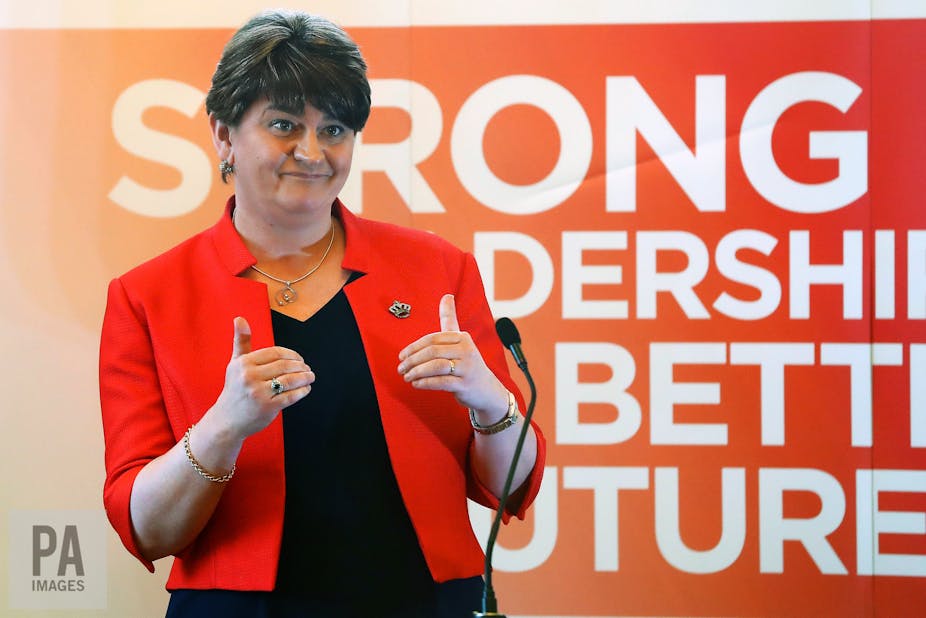Theresa May has failed to win the parliamentary majority she sought when she called a snap election, but the Democratic Unionist Party (DUP) could keep her in power. Having won only 318 seats and with no other party willing to work with them, the Conservatives need the support of the DUP’s ten MPs to lay any claim to a working majority in parliament.
A hung parliament is nothing new, nor is it unusual for Irish MPs to effectively hold the balance of power. In 1885-86, 1892-95 and 1910-15 they were repeatedly able to use this position to push minority Liberal governments to move towards home rule for Ireland.
From 1922-70 the North returned a solid phalanx of ten to 12 Tory-supporting Unionists. This allegiance meant that they had no influence on the minority Labour governments of 1924 and 1929-31, which were reluctantly propped up by the Liberals.
Nor were they immediately able to influence the situation when next there was a hung parliament in February 1974. The Conservative prime minister, Ted Heath, had, like May, called an election to strengthen his negotiating hand (in this case with the miners rather than Europe). When Labour won 301 seats to the Tories’ 297, Heath ignored the Unionists, who had split from his party over the recent Sunningdale agreement with the Irish Republic.
Instead, he tried to negotiate with the Liberals before resigning and allowing Harold Wilson to form a minority Labour government. The slim majority of three that Wilson gained at a second election in October that year disappeared on the day James Callaghan succeeded him as prime minister in April 1976. Attritional conflict with a fired-up Tory opposition then ensued. Alongside the better known Lib-Lab Pact of 1977-78, one of the deals Callaghan did to stay in office was with the Ulster Unionists (UUP), in return for offering to review the number of MPs in Northern Ireland.
Into the 90s
As the largest party in Northern Ireland, the UUP was again able to apply leverage in the 1990s. John Major won a Conservative majority of 21 in 1992 but backbench rebellions, defections and by-election defeats meant that deals had to be stitched up to win key votes. In return, the UUP won various concessions from Major’s government, including a select committee on Northern Ireland.

In the 1990s, the DUP derided these gains by the UUP. But having then subsequently wiped out the UUP electorally, they never got the chance to apply their own leverage on the minority government in 2010. Although the general election of that year technically returned a hung parliament, in practice the coalition between the Conservatives and the Liberal Democrats meant that the government commanded a large majority in the House of Commons.
Now, however, things are different. This does not mean that May will necessarily have to turn to the DUP for support all the time. But on issues such as fracking or human rights, she could have difficulties with a few in her own party. Her authority necessarily reduced by the self-inflicted wounds of a poor election campaign, the prime minister may also, like Major and Callaghan before her, face more rebelliousness from her own MPs. Her skills as a deal-maker will be tested in parliament as well as in the European negotiations in the position she now finds herself.
The record of the 1970s and 1990s show that minority governments can survive for long periods. However, in both cases, deals had to be struck sooner or later with Northern Irish MPs. It’s likely that this parliament will be no different if May is to attempt the gruelling task of governing through until 2022 without a majority.
Ironically, in 2014 Tory MPs such as Mel Stride urged the party to consider a deal with the DUP in advance of the hung parliament which was thought likely to result from the 2015 election. Otherwise, Stride warned, demands for major concessions in Northern Ireland were likely to be forthcoming. Before the 2017 election the Tories were mistakenly confident of victory. How quickly things change.

